SWAG : PRESS
Barnes & Noble.com
Embarrassment of Riches Members of the Mavericks, Cheap Trick, Wilco, and Sixpence None The Richer Make a Joyful Noise as Swag
The name signifies a surprise windfall - an unexpected shower of goodies. And that’s exactly what the genre-bending combo known as Swag delivers. You might not recognise the band’s name, but you’ll certainly have no trouble with a family tree that includes the Mavericks (Robert Reynolds), Cheap Trick (Tom Petersson), Wilco (Ken Coomer, who just announced his departure from that band), and Sixpence None The Richer (Jerry Dale McFadden) Initially intended as an outlet for these guys - plus solo singer Doug Powell - to blow off steam, Swag soon began sending out more signals to devotees of edgy pure pop. The band released a couple of limited-edition seven-inch singles on the Space Baby label and then began thinking bigger - or, to be accurate, smaller, as in a shiny five-inch CD. That disc, Catch-all, is every bit the swinging sampler that the title implies, with slashing guitars, sweet harmonies, and even surprise fillings like harmonium bursting from its dozen tunes. McFadden - keyboard player, singer, and all-around perpetual motion machine who also gigs regularly with Reynolds and Raul Malo in the Mavericks - sat still long enough for Barnes & Noble.com’s David Sprague to go through his drawers.
Barnes & Noble.com: Some musicians go to the beach when they usually get some time off. Why did you guys decide to take a busman’s holiday and work in the studio?
Jerry Dale McFadden: To us, this was kind of a vacation - to do what we wanted with no obligation to do anything but please ourselves. It’s kind of a reaction to all the things people have to do once they become “successful”, so deep into the music business that they almost wish they didn’t have to be part of it.Did a lot of the passion for doing the band come from the fact that none of you are, so to speak, the main guy in the bands that pay the bills?
JDM: I know that for Robert, and some degree myself, part of the reason to do Swag came from the fact that the Mavericks is so Raul-oriented. I don’t want to dis him, because he’s a great singer and songwriter, but you start to say, ‘Well, I have songs too’. I’m sure that Coomer might say the same about Wilco. But so few bands are made in the traditional mold anymore – just about all of them revolve around one person.Having tried all-out democracy, with everyone taking lead vocals here and there and everyone contributing to writing, does it work?
JDM: It did because we’ve all been in bands long enough to know the warning signs and know how to work in that context. Of course, if we were doing nothing but Swag all the time, it might be different.Did all those other obligations make this hard to put together?
JDM: The album is kind of a grab-bag, brought together from three sessions done over the course of about two years. And over that period, we’ve played about a half dozen shows, although the timing looks good for us to do a few more around the time the album comes out.Several of the songs here have a serious Kinks-styled vibe.
JDM: Yeah, from the period when the Kinks stopped selling records. [laughs] People have said that Swag is very Beatle-esque, but I don’t really hear all that much of that. When I listen to the record now, I can pinpoint almost every song to the influence of a certain group – the Hollies, the Zombies. We all love ‘60s pop music, but I don’t think it’s blatant enough to call it a revival band.The harmonies, which a lot of bands on that “revival” path seem to ignore, are a big part of Swag’s sound. Does that take a lot of work?
JDM: Very little, actually. Brad Jones, who produced the album, was surprised that we didn’t have to keep going back for more takes. Robert and I did most of ours together on the same microphone. It’s funny, because I’ve always thought we had similar voices, but here, I find it almost impossible to tell which one of us is doing which part myself.There are plenty of love songs on here: Does that mean there’s a lot of autobiography?
JDM: Well, they’re love songs that tell a little story, usually one that has something to do with reality. Like there really was a “Louise” somewhere in England – Manchester, I think – and she really did have a sister. “Lone” was also a real person. That was the name of a girl who checked us into a hotel in Sweden. I don’t know anything about her, so all the stories are made up. But I was so taken by that name, I just went off and started writing.Is that usually the way it works for you?
JDM: Usually, writing is pretty effortless, and I think it should be. If you’re being honest, the feeling should come easily, and I’ve done my share of writing, so the technical parts are pretty easy at this point.Is that actual band (pardon the expression) swag on the album cover?
JDM: It is. Most of it is Robert’s junk, like that Pez dispenser. He’s a big collector of those. We talked about calling the album Junk Drawer, but Robert came up with Catch-all. He’s from Miami. Where I grew up in Texas, we called that a junk drawer.David Sprague
Barnes & Noble.com
March 6, 2001Back to Press Index for more articles
